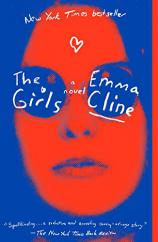The Girls
Review
The Girls
I’ll be the first to admit that I know next to nothing about Charles Manson or the Manson Family. So I didn’t really know what to expect when I opened Emma Cline’s debut novel, THE GIRLS, which was inspired not only by the Manson Family murders but also by a broader culture of cults and communes that has characterized certain subsets of California society for decades. By choosing not to focus on the cult’s charismatic leader or even on the violent crimes that marked its downfall, Cline instead draws attention to the young women, “the girls,” who were in thrall to the cult leader and, as she illustrates, to one another.
"THE GIRLS can be a troubling novel to read at times, but it’s also a much-needed one, as it explores issues of girlhood, belonging and identity that are as vital now as they were more than 40 years ago."
At the center of the novel is Evie Boyd, who is 14 years old at the time of the story’s primary action in 1969. She is a bored suburban teen, enduring friendship dramas and betrayals while also riding the wake of her parents’ divorce. Her dad has found a much younger girlfriend, and her mom has also started to date again. In short, no one is paying attention. So when Evie sees a group of girls around town, beautiful in their self-confidence and utter disdain for the conventional trappings of success, she’s intrigued. She grows especially fascinated by one of them, Suzanne, who eventually (perhaps reluctantly) invites her to visit their commune and meet with their leader, Russell.
Russell, who is hungry for fame and impressed by Evie’s pedigree (her grandmother was a Hollywood starlet), soon finds a place for Evie among the girls who surround him, feeding his ego and sexual desires. But in Cline’s account, we see little of Russell, who remains more or less an enigma; the important relationship is the one between Evie and Suzanne, whom she idolizes, desires and fears simultaneously.
Accounts of what happened to the group in 1969 are interspersed with glimpses of Evie in the present day. Still beautiful but somewhat lonely in middle age, Evie finds herself talking with another girl, Sasha, the girlfriend of a boy whose house Evie is housesitting. As she talks with the younger woman, Evie occasionally marvels at how far girls have come since 1969 --- and how far they still have to go. “Poor girls,” Evie thinks. “The world fattens them on the promise of love. How badly they need it, and how little most of them will ever get. The treacled pop songs, the dresses described in the catalogs with words like ‘sunset’ and ‘Paris.’ Then the dreams are taken away with such violent force; the hand wrenching the buttons of the jeans, nobody looking at the man shouting at his girlfriend on the bus.”
THE GIRLS is full of glimpses --- both explicit and implicit --- of how adolescent girls’ vulnerabilities are entangled with their strengths. Cline couches these considerations --- as well as a compelling character study of a girl on the brink of deciding the shape of her life --- in thoughtful language, filled with unexpected turns of phrase: “She came home with foggy tinges under the skin, bruises that deepened to a vivid meat.” THE GIRLS can be a troubling novel to read at times, but it’s also a much-needed one, as it explores issues of girlhood, belonging and identity that are as vital now as they were more than 40 years ago.
Reviewed by Norah Piehl on June 14, 2016
The Girls
- Publication Date: May 9, 2017
- Genres: Fiction, Historical Fiction, Psychological Suspense, Psychological Thriller, Suspense, Thriller
- Paperback: 368 pages
- Publisher: Random House Trade Paperbacks
- ISBN-10: 0812988027
- ISBN-13: 9780812988024





